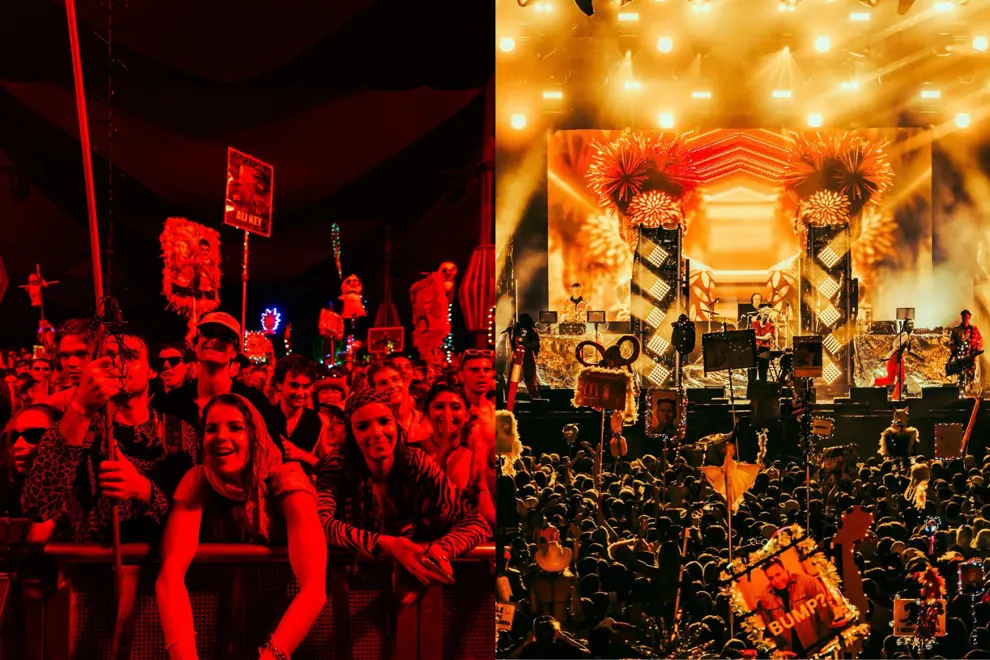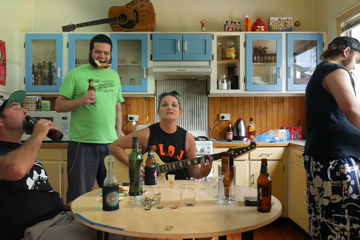Since its humble launch in 2014, the Lost Paradise festival has grown to become one of Australia’s biggest and best summer festivals. It’s one of the many that run over the New Year’s period, closing out one year and welcoming in the next with a riotous celebration of live music, community and all the great things that make us who we are.
The latest edition returned to Glenworth Valley (Darkinjung Country) on the NSW Central Coast, running over for a mammoth five-day stint from December 28 to January 1. We partied hard with a realtime soundtrack of live bangers from Flume, Dom Dolla, Foals, Bicep, PNAU, Lime Cordiale, and The Jungle Giants - to name just a small chunk of the festival’s absolutely wild lineup – but also spent hours immersed in the festival’s unique culture, enjoying a diverse variety of experiences in the Shambhala Fields (where we did everything from yoga to pottery and even sat in on some educational panels) and gearing ourselves up for a truly magical year ahead.
At the heart of Lost Paradise is its incredible team, with dozens of literal legends working behind the scenes to make the festival a dream come true, year after year. They’re led by founder Simon Beckingham, who also works as the CEO for one of the country’s best creative agencies, Finely Tuned, and runs a suite of other life-affirming events (like, for example, the weekly club nights Above and Lost Sundays).
With another stellar edition of Lost Paradise behind us, we sat down with Beckingham to learn just why it is that the festival keeps getting better and better, how it all comes to life, and what the future holds for it.
Lost Paradise has become a huge deal among the Aussie festival circuit. How do you keep making it fresh and exciting each year?
Don't miss a beat with our FREE daily newsletter
I’m lucky to have an amazing team who share a similar trait. We all love festivals, especially camping festivals. When you have a passion, then it comes naturally to keep innovating. Every year, we brainstorm weird and wonderful ideas and how we can execute them at Lost Paradise.
Finely Tuned has been a big player in music for over 15 years. What do you do to stay relevant, and how do you keep your team's creative juices flowing while keeping a cohesive festival vibe?
What's the saying? ‘A rolling stone gathers no moss’. I’m 51 and still love having a dance, and I don’t see that stopping any time soon.
Having a young team who are part of the scene and live and breathe music naturally brings relevance and creativity into the office. I’m very lucky to have a great team. That’s the drum I can beat the loudest!
Doing two weekly club nights (Lost Sundays and Above) also helps. Travelling to other events worldwide is great fun, and it's always good to see what other promoters are doing.
Your festival lineups often feature an electric mix of global stars and music styles. How do you choose artists to ensure the crowd gets a diverse and awesome musical experience?
Lost Paradise has carved out a unique identity in Australia. One part doof, one part live music and one massive party. This has been our motto for years. We have a great live stage that showcases some of the best live acts from around the world and Australia. Having Dom Dolla, Flume and the Foals headline that stage for 2023 is a good example of the range of music.
Our passion lies is electronic music, where we have two stages dedicated to the full breadth of electronic music, with the likes of Bicep, Barry Can’t Swim, and Carl Cox, to name a few.
We try to curate the lineup so it is tasteful and balanced and ticks a box for someone who loves music and wants to delve deeper than a typical one-day event.
Lost Paradise is more than just music; it's an experience. Can you share how you blend music, art, and nature to make it unforgettable?
We make the entire site artistic where we can. All the stages are bespoke, and we layer those elements with creative production.
The soul of Lost Paradise is Shambhala Fields which has grown to become a festival within a festival. It has multiple areas with a huge program ranging from laughing yoga, breath work, pottery, talks, workshops and panels (and even a DJ working) with the likes of Mimi Elashiry and Pottery Boy being a couple of the standout facilitators.
In the music world, things change fast. How do you stay ahead and figure out what festival-goers will love in terms of experiences and performances?
I feel most people are more open to trying new things at a festival. So it is more of a case of curating a program that gives people a chance to learn and experience something they wouldn’t do in their everyday lives.
Your weekly events like Lost Sundays are a big part of Finely Tuned's identity. How do these smaller events fit into the bigger picture, and how do they build a sense of community among music fans?
Clubs and small venues are where the magic happens. They are the incubator that allows up-and-coming artist to find their feet. Personally, I love smaller shows that have a sense of intimacy.
Connecting to those communities probably comes down to three things. Being a part of the community, booking the right talent and creating great content so we can grow the community. It’s a never-ending ecosystem that continues to evolve and change.
We've seen various festival cancellations/postponements lately (ie. Rolling Loud, Don’t Let Daddy Know EDM Festival), as someone knows is knowledgeable on what goes on behind the scenes, can you shed some light on why such cancellations can occur when it comes to festivals?
I’m sure every cancellation has its own story, and it’s a devastating decision when you have no choice. Outside of environmental reasons, inflation is the biggest threat to festivals. It's becoming increasingly challenging due to the breakeven constantly being pushed up.
Working with global artists must have its challenges. How do you make sure international acts fit into the Aussie music scene, and what hurdles do you face in bridging cultural gaps?
We haven’t felt we’ve had to bridge many cultural gaps as the festival circuit is a global community. Bringing artists into the bush does come with some challenges, though, as you can imagine.
As the founder, what moments with Finely Tuned have been the most satisfying for you, and how have they influenced where the company is headed?
Pulling off the first Lost Paradise was a heady mixture of dopamine hits and absolute dread over how much of a hit financially we were going to take (looking back, maybe I should have called it Lost Money!). The lessons we learnt in that first year and how they shaped our resilience are a large part of our DNA today.
Bringing Lost Paradise back after Covid was by far the best promoter experience I’ve had in my 20 years of promoting. The entire team had massive grins on their face for weeks. It was incredible to deliver such a good show to an audience who, in most cases, had never been to a camping festival due to lockdowns. Words really couldn’t describe it.
Looking forward, where do you think Aussie festivals are going, especially after dealing with lockdown during COVID? How do you see the festival scene evolving, and what role do events like Lost Paradise play in that future?
I feel Lost Paradise will grow from strength to strength. We are trying to increase the capacity because we have outgrown our current cap. Although we want to remain boutique so there is a balancing act.
Camping festivals are important, and Lost Paradise has so many facets that provide much more than just music. It’s a place to lose your inhibitions and forget about normal life for a few days. I hope Lost Paradise influences our young Paradisums in the same way festivals changed the course of my life when I was 20.

















